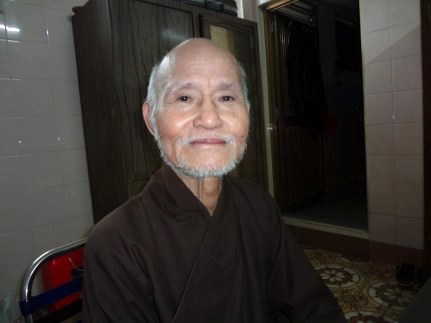
The revered Vietnamese Buddhist monk Thich Quang Do, an outspoken social activist and long-standing champion of human rights and religious freedom, died on Saturday night at the age of 91 at Tu Hieu Temple in Ho Chi Minh City.
One of the two patriarch’s of the Unified Buddhist Church of Vietnam (UBCV), Quang Do has been nominated on several occasions for the Nobel Peace Prize for his advocacy for human rights and democracy. In 2001, Quang Do wrote an “Appeal for Democracy,” calling on dissidents in northern and southern Vietnam to set aside cultural differences and form a united front in 2005. In 2006, he was a recipient of Norway’s Thorolf Rafto Memorial Prize for “his personal courage and perseverance through three decades of peaceful opposition against the communist regime in Vietnam.” (The Rafto Foundation)
In a public statement on Sunday, the UBCV shared Quang Do’s requests from his will, which was signed on April 2019, for a “simple funeral, not more than three days.” The statement added a further request from Quang Do that: “After the cremation, my ashes will be scattered at sea.” (The Japan Times)
The UBCV also urged followers and mourners not to follow the common custom of bringing cash gifts to the funeral: “There will be no final words, no biographies, no emotional showings . . . just praying.” (The Japan Times)
The UBCV was founded in 1964 with the objective of unifying the different schools of Buddhism in Vietnam, partly in response to government hostility toward Buddhist orders during the Vietnam War. Eleven of 14 Buddhist orders in Vietnam were united under the UBCV. The two patriarchs of the UBCV—Thich Quang Do and Thich Huyen Quang—were placed under house arrest by the authorities over their opposition to state restrictions on religion established by the communist government in 1975. In 1981, the new government consolidated all Buddhist organizations under the Buddhist Sangha of Vietnam, outlawingthe Unified Buddhist Church of Vietnam and other organizations not sanctioned by the state.
Thich Quang Do, the patriarch of the banned Unified #Buddhist Sangha of #Vietnam, has passed away. He was 92. Quang Do, a vocal critic of the Hanoi regime, was jailed and put under house arrest for many years. He was nominated for #NobelPeacePrize 9 times! #religion pic.twitter.com/ASJ41YJxDK
— Nga Pham (@ngahpham) February 22, 2020
Thich Quang Do* was born in November 1928 to a rural family in the northern Vietnamese province of Thai Binh, and was ordained as a monk at the age of 14. When he was 17, Quang Do saw his monastic master Thich Duc Hai executed by a Communit court, which became a decisive turning point in his life. In an open letter to the secretary of the Communist Party in 1994, Quang Do stated: “Then and there I vowed to do all that I could to combat fanaticism and intolerance and devote my life to the pursuit of justice through the Buddhist teachings of non-violence.” (Straits Times)
Quang Do furthered his Buddhist education during the 1950s by traveling around Asia, including to India and Sri Lanka, over a seven-year period that also saw him work as an academic at universities. He finally returned to Saigon to teach Buddhism, authoring several Buddhist textbooks and translating a number of Buddhist texts into Vietnamese.
The exiled Vietnamese dissident Dieu Cay described Quang Do’s passing as “a great loss for the UBCV as well as the movement for freedom and democracy in Vietnam.” (BBC News)
* The surname Thich can be translated as “of the Shakya clan,” and is adopted by all Buddhist monastics of the Mahayana tradition in Vietnam, emphasizing their affiliation with the Buddhist community or sangha of Shakyamuni Buddha.
See more
Vietnamese dissident monk who was a Nobel Prize nominee dies at 93 (The Japan Times)
Vietnamese dissident monk, a Nobel Prize nominee, dies (Straits Times)
Hòa thượng Thích Quảng Độ ‘hiến dâng cả đời đấu tranh cho tự do tôn giáo’ (BBC News)
The Fighting Monks of Vietnam (Time)
LAUREATE 2006: Thích Quảng Độ (The Rafto Foundation)











